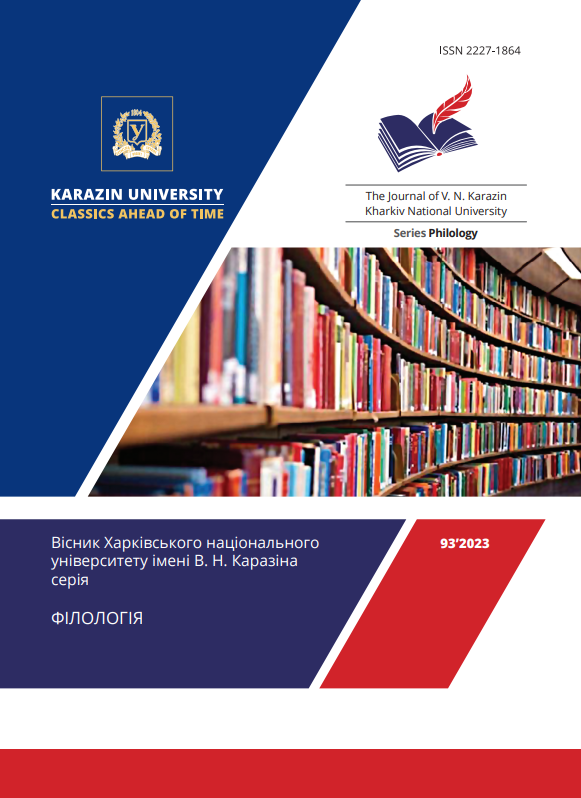Metahistoricism in Vera Bogdanova’s novel “The Season of Poisoned Fruits”
Abstract
The purpose of the article is to trace the narrativization of historical events in Vera Bogdanova's novel The Season of Poisoned Fruit (2022), which focuses on the story of "forbidden" love between cousins. The relevance of the article stems from the fact that the novel has already become a significant phenomenon in contemporary Russian literature, but has not yet found its researchers. The novel's themes include the sickness of Russian society, militarization, extreme xenophobia, propaganda, domestic violence, and social rejection of otherness; through these problems, anti-military and liberal pathos emerges, so the novel should be considered part of a culture that is in opposition to the modern Russian regime. The range of problems in the novel revolves around different strategies for dealing with different personal and historical traumas; however, critics suggest that the generation of "thirtysomethings" does not share the historical trauma of childhood, as, for example, the older generation, which saw the collapse of the USSR as children.
The article demonstrates how the novel's text perceives the traumatic events of Russian and world history (the events in Moscow in 1993, the terrorist attacks in Moscow and London, the forest fires of 2010, etc.) through the prism of the perception of several representatives of the millennial generation ("the generation of thirty-somethings"). The article shows how state propaganda and hierarchized narrative of the story replace the protagonists' personal memories of events, which, in turn, become taboo. The intervention of a discourse that narrates the story in the spirit of Russian propaganda is made possible by the constant presence and unrelenting intensity of television intrusions into the protagonists' personal lives. It is assumed that the novel has several strategies for organizing the interaction between general and personal history, including (1) aggression and the search for those responsible for historical tragedies; (2) ignoring, (3) mystical metahistorical linking of historical and personal events.
Downloads
References
Altynbaeva, G. (2023). Artistic and documentary aspects in the prose of the "thirty-year-olds" generation. Philology and Culture, 2, 104-110. https://doi.org/10.26907/2782-4756-2023-72-2-104-110
Altynbaeva, G., & Dorofeeva, Yu. (2023). "Desperate generation" prose: key features of the "thirty-year-olds" literature. Bulletin of Voronezh State University. Series: Philology. Journalism, 3, 5-11.
Babai, P., & Dashkevych, M. (2022). Narrativization of historical trauma and the poetics of anachronism in Russian literature of the 21st century. Scientific Collection "InterConf+," 18(95), 399–407. https://doi.org/10.51582/interconf.19-20.01.2022.041
Babai, P. (2023). Meta-historical reflections in the projection of contemporary literature. Grail of Science, 32, 240–246. https://doi.org/10.36074/grail-of-science.13.10.2023.041
Bogdanova, V. (2023). Season of Poisoned Fruits. Moscow: Elena Shubina's Edition.
Nemirov, V. (2023, May 1). "These people came to stay." Year of Literature. https://godliteratury.ru/amp/articles/2023/04/29/eti-liudi-prishli-chtoby-ostatsia
White, H. (2002). Metahistory: Historical imagination in nineteenth-century Europe. (E. G. Trubina & V. V. Kharitonov, Eds.). Yekaterinburg: Ural University Publishing House.
Sharapova, E. (2023). Comparative tropes and their interaction in Vera Bogdanova's novel "Season of Poisoned Fruits". Discourse and Language in the era of "Big Data": Variability, Creativity, Experiment. 237–246.
Yuzefovich, G. (2017, July 1). Dmitry Glukhovsky becomes a great writer, and Olga Breining is the hope of Russian literature. Meduza. https://meduza.io/feature/2017/07/01/dmitriy-gluhovskiy-stanovitsya-bolshim-pisatelem-a-olga-breyninger-nadezhdoy-russkoy-literatury
Yuzefovich, G. (2022, May 14). "Season of Poisoned Fruits" — a novel about children who unwittingly repeat their parents' mistakes and the traumas of a generation raised in Russia in the nineties and zeros. Meduza. https://meduza.io/feature/2022/05/14/sezon-otravlennyh-plodov-roman-o-detyah-kotorye-nevolno-povtoryayut-oshibki-svoih-roditeley
Yuzefovich, G. (2022, October 18). Post on the Telegram channel "Ryba Lotsman" from 18.10.2022 18:51. https://t.me/ryba_lotsman/890




